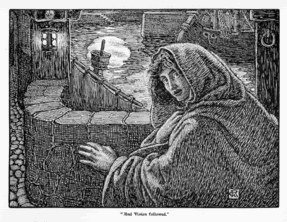This is Part 2 in a series of articles about Sexual Harassment and the Church. To view other articles in this series, please click on the links at the bottom of the page.
As women in professions ranging from everything from government, to entertainment, to tech industries to blue collar workers come forward with serious claims of terrible behavior by men in power, one field where women are still silent about their abuse is the church.
The stories of women being harassed and forced into unwanted sexual encounters in order to “make it” in Hollywood shouldn’t surprise us. We even have a term for it: the “casting couch”. We shouldn’t be surprised by all the allegations currently being made about those in the entertainment industry – even the most talented ones, or about politicians – even the politicians we voted for and support. The same should go for clergy. None of this should surprise us, but it should horrify us.
All of the women I spoke with wanted me to share their stories, but most asked that I not give their names or any identifying details of what had happened to them. These women have spent time on the church’s version of the “casting couch.” They are women who have served the church as paid and unpaid laity, seminarian students and ordained clergy and all of them have experienced some form of
sexual harassment, sexual assault, and abuse by clergy and church leadership.
Their fears of being outed are legitimate and aren’t any different from those in other professions, white or blue collar.
In New York Time’s article, We Asked Women in Blue-Collar Workplaces About Harassment. Here Are Their Stories, it is the fear of not being able to work that keeps women from reporting harassment. “‘Regardless of who you work for, you will run into the same people over and over again who will not want to work with you just because you reported harassment,’ Concetta Defa, a construction worker in Utah, wrote. ‘In most cases women become unemployable because of it.’ That fear is one reason many experts in the field believe that sexual harassment is underreported — and remains rampant — in blue-collar workplaces.”
Pastor G found out too late that the senior pastor she was going to be working with had been investigated for sexual misconduct with another female pastor. While the story of what happened sounds a lot like sexual coercion and assault on his part, he wasn’t even sanctioned for committing adultery though he was married.
Despite the fact that church officials had neglected to share this pertinent information with her before she accepted her call, members of the congregation were not so silent once she began working there. The lewd public displays of sexual behavior were well known in the community as other people in the area informed her they had left the church because “of all the sex stuff.”
Pastor G willingly admits that the gossip she heard was hear-say. While her own encounters with the senior pastor involved inappropriate sexual statements and bullying tactics, she did not see the blatantly lewd behavior first-hand. What she was told about the sexual misconduct case and his wild behavior came from third parties, but perhaps that’s part of the problem. When a pastor is accused of sexual misconduct and the allegations are substantial enough to warrant an investigation just how far should secrecy go and who is this confidentiality really meant to protect?
In the case of Pastor G and her congregation, disclosure that their senior pastor had been/was being investigated for sexual misconduct might have meant that allegations by other victims could have been investigated and a clearer, more complete picture of a predator could have been seen.
When she reported her own experiences along with another witness, she was warned that she was not to discuss any of it with anybody and that they would never be able to place her in another call if she ever talked about it. She was told, just to keep your head down and keep quiet.
The phrase: “You’ll never work in Hollywood again” has serious meaning to all women. It doesn’t have to be spoken out loud to be said. It doesn’t matter that spokespeople for individuals, different organizations, and institutions deny sexual harassment or make claims to the contrary. Sexual harassment, abuse, and assault in the workplace are deeply ingrained in our patriarchal culture.
Women who get harassed at work – regardless of the field – have lived with some form or another of imposed silence because they have had to in order to work and to survive. As one pastor told me, “Yeah. I've got friends with worse stories than mine but they're interviewing for jobs so [they’re] not able to share either. The veil of silence the church imposes is real. You cry foul, you’re labeled a
troublemaker.”
Why have women stayed quiet? HR departments, unions, bishop’s offices, etc. might claim that they are there to support individuals within an organization, but ultimately the onus is on them to protect the organization. Yes, there are many examples, especially within the church, of confronting the issue and caring for victims (stayed tuned for that article), but there are still too many that don’t.
“Yeah” says “L” The silencing is so hurtful.” L and I have been corresponding for almost a year now. Since I’ve known her, she has fearfully struggled with going public about any of her story. When I messaged her the link to Part One of these articles she responded: “Christine, thanks for the article. I just sent you an email. A friend of mine tried to reach out to Bishop Eaton (the Presiding Bishop of the ELCA) about my situation. I sent you her request and the formal reply. I am sure that she doesn’t want
her name attached to this. Of course, none of us do. If you tell my story, you can say that an intern was fired and publicly blamed after being molested by her supervising pastor. A pastor who had
been accused of sexual harassment by his previous intern.”
In the emails L references, her friend reached out to the ELCA because she saw a situation of sexual misconduct being handled inappropriately by a synodical bishop. In that initial contact, the fact that L was still being victimized was made clear: “As a life-long Lutheran I am in a spiritual crisis watching our
Church allow one man (Synod Bishop) to have all this power over a tragic situation. Watching the victim continue to be re-victimized by the Bishop and others is heartbreaking & extremely upsetting.”
Herfriend was contacted by the Assistant to the Presiding Bishop for Governance who stated that, “The ELCA's governing documents do not give the presiding bishop any authority to intervene. Bishop Eaton also does not supervise synod bishops.” The bishop’s assistant offered the name of the person in the ELCA to whom reports of sexual misconduct could be made (who was already aware of the situation), then added that a copy of their correspondence had been sent to L’s bishop.
Perhaps the reason why L and I bonded was the hope we had both shared that eventually
someone from within our denomination’s hierarchical structure would stand up for us. Perhaps we bonded because it often felt intentional when our hope was shattered.
Why would someone on the staff of the presiding bishop copy that email to the person who was being accused of victimizing L? Why wouldn’t that person have investigated further before responding the way she did? Couldn’t she have spoken to the ELCA contact on misconduct about the situation herself? Why is there no recourse for a person who has experienced wrongdoing by their bishop?
L learned about the church’s casting couch the hard way. Her internship ended prematurely when her supervisor-pastor forced her onto his couch then blamed her for his misconduct. He lost his position, but so did she. Unable to finish internship she’s also been unable to finish the process needed to be ordained.
We women chose to go into the field of ordained ministry in order to, as the hymn goes, tell the story of Jesus and his love. Sexual harassment, abuse, assault and the responses of those in positions of power to victims should not be an impediment to telling that story.
Yeah, the silencing is indeed hurtful.







No comments:
Post a Comment